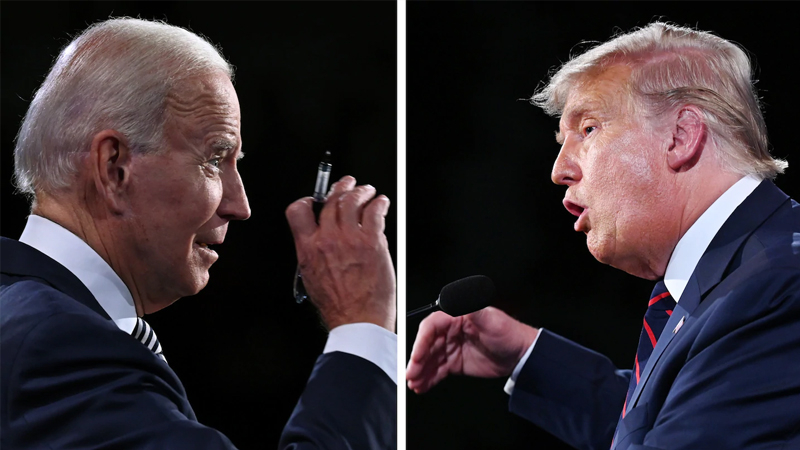The first presidential debate was chaotic. Here's why improving the next one will be tough.

No sooner had the dust had settled on the first presidential debate of 2020 than the reactions rolled in. The 90-minute showdown between President Donald Trump and Democratic nominee Joe Biden was called a "dumpster fire," a "train wreck" and other less print-friendly names.
Amid the acrimonious exchanges, Trump repeatedly interrupted Biden and moderator Chris Wallace of Fox News. The spectacle prompted questions over the usefulness of the format and claims the debate in Cleveland was the worst in living memory. Just as swift as the criticism were the calls for changes to how the debates are run.
With two more presidential debates and one between the vice-presidential candidates yet to come, viewers were clear they don't want a rerun of Tuesday - and neither does the Commission on Presidential Debates: The commission made the unprecedented announcement Wednesday that it was considering changes to the remaining debates.
"Last night's debate made clear that additional structure should be added to the format of the remaining debates to ensure a more orderly discussion of the issues," the commission said in a statement. It did not specify what changes it may make, and did not respond to requests for comment.
But experts warn the remedies are not simply a matter of fine-tuning the rules. Debates are grounded by established rules but also political norms and traditions. Both are only as strong as the candidates' willingness to respect them, said Alan Schroeder, a presidential debate historian and author of the book "Presidential Debates: Risky Business On the Campaign Trail."
"Debates really depend on the goodwill of the participants to follow some baseline agreements; that we're going to let each other talk and let the audience hear the contrasts in the positions," Schroeder told The Washington Post.
- - -
The Commission on Presidential Debates and presidential campaigns operate in tandem, but with distinctly different goals: The campaigns are trying to woo the public, while the nonpartisan commission aims to educate it.
The CPD has organized presidential debates since 1987, when it took over the duties from the League of Women Voters. Over the years, it has gradually wrested control over key decisions such as the debate format, schedule and choice of moderator from the campaigns.
"The commission sort of arrogated that control for themselves. And really they had to, because it was getting out of hand," said Schroeder, the debate historian. The apex of campaign demands came in 1984 when aides to President Ronald Reagan and Democratic nominee Walter Mondale rejected nearly 100 reporters the League of Women Voters proposed as moderators for the debate.
Now the CPD determines the format, the moderators, debate participants, some of the topics and the venues (based on a list of eligible applicants). If the candidates accept those terms, the CPD sponsors the debate.
"Everything kind of depends on the buy-in from the campaigns," Schroeder told The Post, noting a candidate can always decline to participate if they don't like moderator or a proposed format. "If you get too radical in the structure of the debates, you're likely to have a problem with the candidates' willingness to participate."
Candidates can agree to even more granular rules in the form of a memorandum of understanding drawn up between the campaigns. Formal MOUs outline detailed rules of engagement, from how each candidate should be addressed, to seating or standing arrangements, to room temperature. The 2012 agreement between the Obama and Romney campaigns included rules against using props or visual aids and barred follow-up questions from the audience during the town hall.
During Tuesday's debate, Wallace repeatedly reminded Trump of the time limit rules his campaign had agreed to with the CPD.
The Post learned Wednesday that there was no traditional MOU between the Biden and Trump campaigns for the 2020 debates.
- - -
Trump has made unpredictability part of his political brand, which Schroeder pegged as the source for many of the current debate challenges.
At the same time, journalists who cover the presidency - including debate moderators - have reliably held to the custom of showing deference to the officeholder. Schroder suspects moderators may still be reluctant to silence a candidate's microphone or "reinvent the entire exercise to accommodate one candidate's quirks."
Muting a speaker on live TV is awkward, and could go wrong.
"Do they start shouting? Does Trump walk over to Biden's lectern and talk into his mic? All bets are off with this particular debater," he said.
But even chaotic debates have value to voters, argued Kathleen Hall Jamieson of the Annenberg Public Policy Center. How the candidates respond - and what they will or won't respond to - offers insight into their habits and mind-set.
"You can say 'Oh, that's what Donald Trump thinks? He doesn't use evidence to support arguments,'" Jamieson said. "Historically, we're going to remember the debate through the journalistic frame."
In one exchange from Tuesday, Trump said the California wildfires were a problem of forest management, while Biden acknowledged the impact of climate change on their intensity.
Jamieson cited another example when Trump taunted that Biden is controlled by the left wing of his party. "I am the Democratic Party right now," Biden replied. Jamieson said the rebuttal wasn't just a frustrated response or throwaway line: "He's telling voters he's a moderate compared to the liberal wing of the party."
Jamieson said debates will be of greater benefit to the public if the way they're covered improves, and that reporters should dig into what information the candidates whisper as well as shout. Most important, she said, is following up the next day on unanswered questions so the public can clearly see the crucial moments where a candidate stayed quiet.
